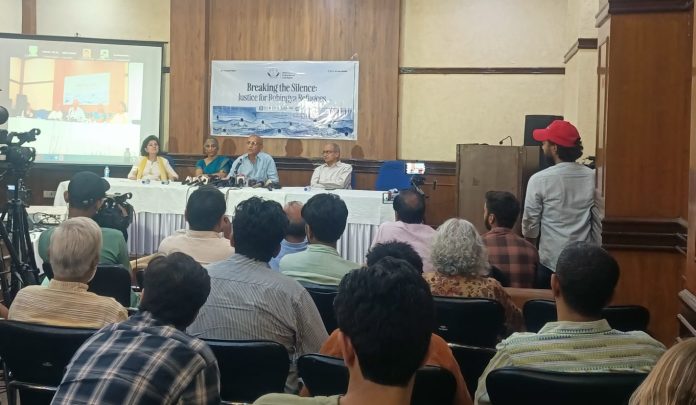– Mohd.Naushad Khan
New Delhi: Amid rising detentions and deportations of Rohingya refugees in India, the Association for Protection of Civil Rights (APCR) held a press conference at the Press Club of India. Legal experts, journalists, and activists called for an urgent policy change and greater compassion for this persecuted community. They urged the government and the Supreme Court to protect Rohingyas under Article 21 of the Constitution, which guarantees the right to life with dignity. Activists also demanded strict adherence to legal procedures and international norms during detention and deportation.
The event, titled “Breaking the Silence: Justice for Rohingya Refugees,” featured Senior Advocates Prashant Bhushan and Colin Gonsalves, journalist Pamela Philipose, peace activist Dr. Harsh Mander, and representatives from the South Asia Forum for Human Rights and the Azadi Project.
Dr. Harsh Mander said Rohingyas have sought identity worldwide for centuries. In India, their population is about 22,500, according to the UN. Despite this, the government has failed to care for them. Rohingya settlements are worse than the poorest slums, with people living in dire conditions and selling garbage to survive. The government denies them legal status and detains many in centers worse than jails. These detention centers offer no hope of release, as neighbouring countries refuse to accept them. Faced with genocide, international law prohibits their removal, yet pushbacks continue. He warned that silence amounts to complicity and stressed that helping the 22,000 Rohingyas reflects compassion, not increased poverty.
Senior Advocate Colin Gonsalves criticised the Supreme Court for telling a Tamil refugee that “India is not a Dharamshala.” He reminded that India has historically offered refuge to persecuted groups like Tibetans, Sikhs, Tamils, and Rohingyas. He condemned the deportation of Rohingyas, including children, into dangerous situations. Gonsalves emphasised that Article 21 protects all, regardless of citizenship. He criticised political rhetoric that brands refugees as criminals without evidence and expressed frustration over judicial neglect of urgent human rights issues.
Prashant Bhushan questioned whether India, which claims to follow Vasudhaiva Kutumbakam and democracy, still has humanity. Despite genocide in Myanmar, Rohingyas in India face illegal detention and pushbacks, sometimes even being abandoned at sea. The government argues India is not party to the Refugee Convention but ignores other treaties against torture and protecting child rights. Bhushan criticised both government and judiciary for failing to uphold Article 21 and called on civil society to act with compassion.
Journalist Pamela Philipose highlighted global erosion of human rights, citing Israel’s state policies as an example. She detailed India’s treatment of Rohingyas since 2016, including deportations, biometric tracking, and political rhetoric calling them “termites.” India ignored UN warnings and forcibly returned refugees during the pandemic without due process. The Citizenship Amendment Act excluded Muslim asylum seekers, worsening their plight. India abstained from UN resolutions condemning Myanmar and allegedly supplied arms to the junta. Between 2023 and 2025, India discredited UNHCR cards and detained refugees, with reports of blindfolded deportees abandoned at sea.
The speakers united in demanding urgent judicial and civil intervention. They urged India to uphold its constitutional and humanitarian duties to protect Rohingya refugees’ rights and dignity.




